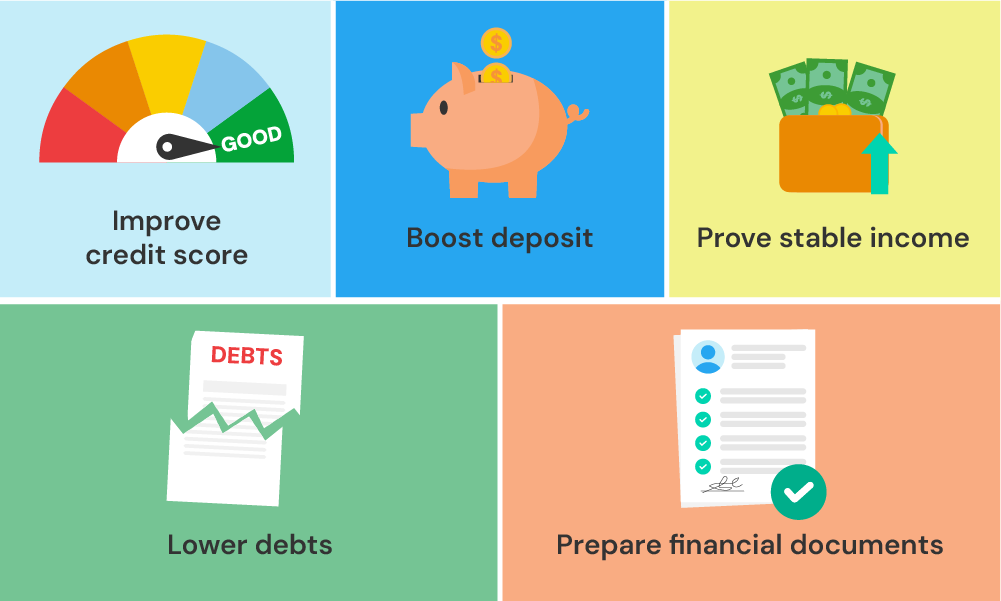- Can I Get a Mortgage on a Casual or Temporary Job?
- Can Agency Workers Get a Mortgage?
- How Much Can I Borrow As A Temporary Worker?
- How To Qualify for a Mortgage on a Temporary Contract?
- How To Secure a Mortgage on Temporary Contracts?
- Who Offers Mortgages for Temporary and Agency Workers?
- Tips to Boost Your Mortgage Application on a Temporary Contract
- The Bottom Line
How To Get Mortgages On A Temporary Contract: A Full Guide

If you’re a temporary or agency worker in the UK, the idea of securing a mortgage might feel overwhelming. Your work situation can lead to less predictable income compared to those in permanent roles.
But, this doesn’t put a mortgage out of your reach.
Knowing what lenders want and getting help from a mortgage broker are crucial steps. Lenders vary in their requirements, with many showing flexibility towards non-traditional employment.
This guide will walk you through everything you need to know about applying for a mortgage as a temporary or agency worker.
Can I Get a Mortgage on a Casual or Temporary Job?
Yes, you can get a mortgage if you’re in casual, freelance, or temporary work. How successful you are will depend on your situation and your ability to show solid income.
Gig workers or those in flexible jobs need to use all available evidence to show they’re financially stable. This way, you can get the loan amount you need with competitive rates.
Lenders are increasingly adapting their rules to accommodate the modern, varied ways people work.
Although there are hurdles, the changing market is creating more chances to find a mortgage that matches your work and financial situation.
In both scenarios, getting advice from an expert is invaluable. A knowledgeable mortgage broker is crucial in connecting you with suitable lenders, making the mortgage approval process smoother for those in non-traditional employment.

Can Agency Workers Get a Mortgage?
Many think mortgages are off-limits for agency workers, but that’s not true. Getting through the mortgage application process might be tougher without expert help.
Fewer lenders may be ready to lend to agency workers, but it’s still possible to get a mortgage with the right steps.
If you have a fixed-term contract and can show steady income, the process becomes easier.
Even without a fixed contract, working with a skilled mortgage broker can help you find lenders who fit your needs.
How Much Can I Borrow As A Temporary Worker?
The amount you can borrow depends on your overall financial situation.
In the UK, lenders use a multiple of your annual income to decide on the maximum loan amount. This usually ranges from 4 to 4.5 times your annual earnings.
However, this can vary depending on the lender’s criteria and your specific financial situation.
They might also consider any extra money you make, giving them a fuller picture of what you can afford. If your income varies, it might be worth looking into mortgages designed for lower incomes.
To get a clearer picture of how much you might be able to borrow, using a mortgage affordability calculator can be insightful.
Simply input your total household income to receive an estimate, helping you plan your mortgage application more effectively.
[Embedded Calculator]
How To Qualify for a Mortgage on a Temporary Contract?
To qualify, here’s what usually lenders look for:
Your Contract and Work History
Lenders check how long and what type of contract you have. Usually, you need to have been on your contract for about 12 months to show stability.
But, some lenders are more flexible and might accept different types of contracts, even if they’re not fixed-term.
They also look at gaps in your work – up to six weeks is generally acceptable for some lenders.
The loan-to-value (LTV) ratio is key, especially if you’re a temporary or agency worker.
You might need a deposit of at least 20% for mortgages with an LTV of around 80%. If saving this much is tough, a mortgage broker could help you find options that need a smaller deposit, starting from 5% to 10%.
Credit Score
A strong credit score is crucial as it indicates your reliability in managing and repaying debt.
Lenders will review your credit history for any red flags like missed payments or defaults. A higher score can improve your chances of approval and possibly secure better mortgage rates.
Lenders evaluate your debt-to-income ratio, which is the percentage of your monthly income that goes towards paying debts. A lower ratio shows lenders that you’re not overextended, making you a less risky borrower.
Savings and Financial Reserves
Having savings or financial reserves beyond the deposit can also influence a lender’s decision.
It shows that you have a cushion to fall back on if your income fluctuates or you face unexpected expenses, making you a more stable borrower.
Outgoings and Living Expenses
Lenders will assess your regular outgoings and living expenses to ensure you can comfortably afford mortgage payments on top of your current lifestyle. This assessment helps them gauge the risk of lending to you.
Future Income Prospects
Sometimes, lenders might consider your future income prospects, especially if you’re in a field with predictable income growth or if you have a clear career trajectory.
This can be particularly relevant for recent graduates or those in professions with structured pay scales.
Showing Your Income
Proving your income can be tricky without regular payslips. But, your latest P60 and contracts can show most lenders what they need to know.
The more detail you can give about your income, the better your chance of getting a mortgage that suits your situation as a temporary or contract worker.
How To Secure a Mortgage on Temporary Contracts?
Getting a mortgage on temporary contracts involves a few extra steps compared to traditional employment situations.
Here’s a step-by-step guide to help you navigate the process:
Gather Your Documentation
Start by collecting all necessary documents that prove your income and employment history. This includes:
- For the employed: Payslips (P60) or other income proof for the last 3-6 months.
- For the self-employed: Business accounts and tax returns (SA302) for the last 2-3 years.
- Bank statements for the last 3-6 months to show your income and savings.
- Identification and proof of address, like a passport and utility bills.
- Current and past work contracts or letters from employers to show your work arrangements
- Any proof of documents for existing loans and outgoings.
The more evidence you can provide of consistent income, the better.
Optimise Your Credit Report
First, get free copies of your credit file from credit agencies – Experian, Equifax, or TransUnion.
Check for any inaccuracies and take steps to improve your credit score. This means paying down existing debts, making sure all bills are paid on time, and avoiding new credit applications before your mortgage application.
Select the Right Lender
Not all lenders are comfortable with temporary contracts, so it’s crucial to find those that are.
Research lenders’ criteria or, better yet, work with a mortgage broker who specialises in non-standard employment situations. They can help match you with lenders more likely to approve your application.
Consult a Specialised Mortgage Broker
A broker experienced in dealing with temporary and agency workers can be invaluable.
They understand the market and can advise on how to best present your application. They also have access to lenders that might not be directly available to you.
Apply
Once you’ve found the right lender and prepared your documentation, submit your mortgage application.
Your broker can guide you through this process, ensuring all paperwork is completed accurately.

Who Offers Mortgages for Temporary and Agency Workers?
In the UK, many major lenders are open to giving mortgages to temporary and agency workers. Some of the well-known ones include HSBC, Santander, Nationwide Building Society, NatWest, and TSB.
But, remember, this list doesn’t cover everyone.
Finding the right lender on your own can be tough, especially if you’re not familiar with their specific requirements.
That’s where a mortgage broker comes in handy. They can figure out which lenders are likely to approve your application and talk to them for you.
Brokers can get you access to a wider range of mortgage options that fit your situation, sometimes with better interest rates than you’d get by going straight to the lender.
Tips to Boost Your Mortgage Application on a Temporary Contract
Applying for a mortgage on a temporary contract can be easier with these tips:
- Improve Your Credit Score. A strong credit score is crucial. Demonstrate your financial responsibility by paying bills and loans on time, keeping credit card balances low, and avoiding new credit applications.
- Increase Your Deposit. A larger deposit makes lenders more inclined to offer you a loan, possibly with better terms. Aim to save more than the minimum requirement.
- Prove Your Income Is Stable. Lenders want to see consistent earnings. Gather your payslips, bank statements that show income and any other documents that prove your earnings over the past two or three years.
- Reduce Your Debt. Lower debt levels make you a safer bet for lenders. Work on paying off existing debts and avoid taking on more.
- Organise Your Financial Documents. Having your financial documents in order is key. This includes your P60, tax returns, and any other relevant paperwork.

The Bottom Line
As a temporary or agency worker, you’ll need to put in extra work to show lenders that your income is stable and reliable.
Despite the hurdles, remember that plenty of lenders are open to various employment types, and the trick is to find the right one for you.
Talking to a mortgage broker who knows the ins and outs of non-standard employment can change the game for you. They’ve got the know-how and the connections to pair you with lenders who get your situation.
This kind of support can lift your spirits and boost your chances of getting through the mortgage process successfully.
If owning a home is your dream, don’t let your job type stop you. With the right preparation and guidance, you can make it happen.
Looking to cut down on the time and stress of finding the perfect broker? Reach out to us. We’ll hook you up with a trustworthy broker ready to tackle your mortgage challenges.
Get Matched With Your Dream Mortgage Advisor...

Frequently asked questions
What deposit will I need as a temporary worker?
The deposit required can vary widely depending on the lender and your specific circumstances.
Generally, temporary workers might need to provide a larger deposit to offset the perceived higher risk.
It’s not uncommon for lenders to request deposits of 15-20%, though some government schemes and lenders may allow for less.
Can I get a mortgage during my probationary period?
Yes, it’s possible, but it can be more challenging. Lenders will look closely at the stability and longevity of your employment. Demonstrating a strong employment history and income stability outside of the probationary period can help.
Some lenders are more flexible than others, and a mortgage broker can advise on the best approach.
This article has been fact checked
This article was created, checked, and verified by the expert team at Money Saving Guru. Trust us, you’re in good hands.




